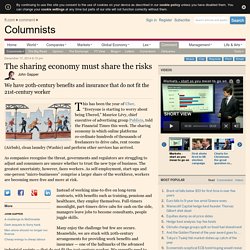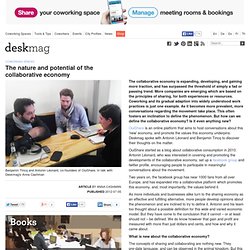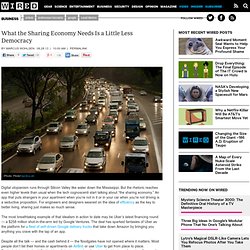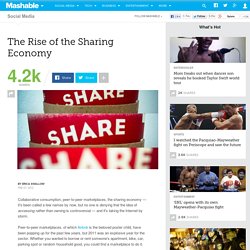

The sharing economy must share the risks. We have 20th-century benefits and insurance that do not fit the 21st-century worker ©Ingram Pinn his has been the year of Uber.

“Everyone is starting to worry about being Ubered,” Maurice Lévy, chief executive of advertising group Publicis, told the Financial Times this week. The sharing economy in which online platforms co-ordinate hundreds of thousands of freelancers to drive cabs, rent rooms (Airbnb), clean laundry (Washio) and perform other services has arrived. As companies recognise the threat, governments and regulators are struggling to adjust and consumers are unsure whether to trust the new type of business. Autour des pratiques collaboratives. Pour la première fois de son histoire, notre société est confrontée à la gestion de l'abondance.

The nature and potential of the collaborative economy. The collaborative economy is expanding, developing, and gaining more traction, and has surpassed the threshold of simply a fad or passing trend.

More companies are emerging which are based on the principles of sharing, for both experiences or resources. Coworking and its gradual adaption into widely understood work practices is just one example. As it becomes more prevalent, more conversations regarding the movement take place. This often fosters an inclination to define the phenomenon. What the Sharing Economy Needs Is a Little Less Democracy. Digital utopianism runs through Silicon Valley like water down the Mississippi.

But the rhetoric reaches even higher levels than usual when the tech cognoscenti start talking about “the sharing economy.” An app that puts strangers in your apartment when you’re not in it or in your car when you’re not driving is a seductive proposition. For engineers and designers weaned on the idea of efficiency as the key to better living, sharing just makes so much sense.
Trust and user experience. “Towards a Cooperative, Small scale, Local, P2P Production Future” – back from the OuiShare Summit in Paris « Meedabyte. (Italian translation of the post follows here – La traduzione in italiano è disponibile qui) I’m fresh back from the first OuiShare Summit in Paris – that has been held in the wonderful coworking space “La Mutinerie” - where I had the amazing opportunity to gave a talk entitled “Towards a cooperative, small scale, local, p2p production Future” in which I really tried to connect the dots over a bunch of topics, amazing authors and also writings that I’ve done on my own, especially the latest three on the blog.

OuiShare initiative was born in Paris during 2010 mostly thanks to the energy and sociablity of Antonin Leonard following the global wave of interest around two seminal books that have been published those days: Rachel Botsman’s and Roo Rogers’ “What’s mine is yours” and Lisa Gansky’s “The Mesh”. The paradigm of cooperation is, indeed, one – probably the only one – credible alternative that our global society should tackle in pursuit of a future of some kind. Like this:
The Rise of the Sharing Economy. Collaborative consumption, peer-to-peer marketplaces, the sharing economy — it's been called a few names by now, but no one is denying that the idea of accessing rather than owning is controversial — and it's taking the Internet by storm.

Peer-to-peer marketplaces, of which Airbnb is the beloved poster child, have been popping up for the past few years, but 2011 was an explosive year for the sector. Whether you wanted to borrow or rent someone's apartment, bike, car, parking spot or random household good, you could find a marketplace to do it. This is only the beginning, though; 2012 looks to be a promising year for those involved with the sharing economy.
Super angel Ron Conway recently identified it as 2012's hot area for angel investment in The Economist. And Fast Company deemed 2012 the "year of peer-to-peer accommodations," thanks to the emergence of Airbnb clones that hinged off of the company's outstanding growth. It's All About Value Knodes and SnapGoods founder Ron J. Renting vs.
Startup. Vision critique. La consommation collaborative. Parmi les nouvelles tendances de consommation qui se sont développées ces dernières années et qui sont favorisées par la crise économique actuelle, la consommation collaborative est certainement l’une des plus intéressantes. Elle a même été citée par le très sérieux Time Magazine comme l’une des dix idées qui vont changer le monde ! Cette forme de consommation peut se manifester de nombreuses manières, puisqu’il peut s’agir de louer, prêter, partager ou encore échanger des biens ou des services, tout en créant de nouvelles formes de lien social.
Facilitée par le développement des réseaux sociaux et plus généralement des communautés sur internet, la consommation collaborative est actuellement en plein boom, et touche de nombreux secteurs d’activité. Voici les 3 grands types de consommations collaboratives, ainsi que quelques exemples de sites internet correspondants : 2011-12-13%20-%20TR%204%20-%20Consommation%20collaborative%20%28Antonin%20LEONARD%29. L'émergence de la Consommation collaborative - Economie.
Jeff Jarvis : « Nous pouvons voir les prémisses d’une nouvelle économie basée sur le partage » Méconnu en France il y a encore quelques mois, Jeff Jarvis s’est fait remarqué en mai dernier, lors de la grande messe l’e-G8.

Face à un parterre d’entrepreneurs du web encravatés, il interpellait alors Nicolas Sarkozy pour lui demander de prêter une forme de serment d’Hippocrate : « ne pas blesser internet ». Éditorialiste, blogueur sur BuzzMachine.com et directeur du Tow-Knight Center for Entrepreneurial Journalism à l’université de New York, Jeff Jarvis fait parti des gourous du web outre-atlantique.